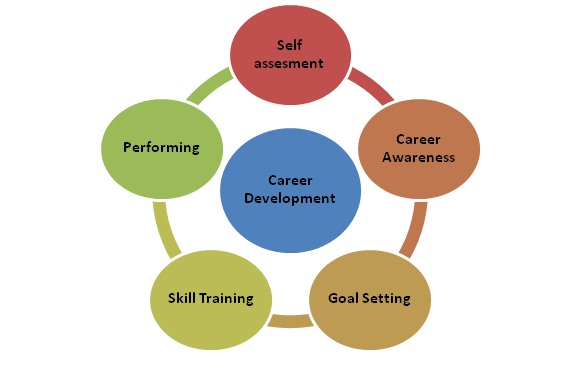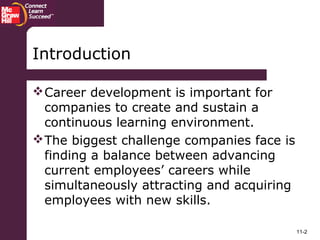Introduction to Career Growth: Unlocking Your Potential for Success
Career growth is an essential element for anyone looking to progress in their professional life. Whether you’re just starting out or looking to climb the corporate ladder, understanding career development is crucial for long-term success. This comprehensive guide will walk you through what career growth is, why it’s important, and how you can take actionable steps to ensure a thriving career.

What is Career Growth?
Career growth refers to the continuous development and advancement of an individual within their professional life. This involves gaining new skills, taking on more responsibilities, expanding your knowledge, and increasing your value in the workforce. Career growth isn’t just about moving up the organizational hierarchy—it’s also about enhancing your personal growth, work-life balance, and job satisfaction.
The goal of career growth is not just to earn promotions but to constantly improve your abilities, understand the evolving needs of the market, and adapt accordingly. Career development is the process that helps individuals enhance their skills and expertise, preparing them for new opportunities and challenges.
Key Components of Career Growth
- Skill Development: Building new skills is crucial for career advancement. Whether through formal education, workshops, or on-the-job learning, skill development ensures you stay competitive.
-
Networking: Establishing professional relationships helps open doors for new opportunities. Networking with colleagues, mentors, and industry peers is vital for career growth.
-
Leadership and Responsibility: Taking on leadership roles or additional responsibilities helps you grow as a professional. It signals to employers that you’re ready for greater challenges.
-
Work-Life Balance: A fulfilling career isn’t just about the work. Achieving balance between personal and professional lives is crucial for long-term growth and job satisfaction.
-
Performance and Results: Demonstrating strong performance and delivering results is perhaps the most important factor in your career growth. Consistently exceeding expectations can position you for promotions and raises.
Why is Career Growth Important?
Career growth plays an integral role in both personal and professional success. Here’s why it’s so important:
1. Increased Job Satisfaction
A person who feels stagnant in their job is likely to experience dissatisfaction. Career growth, on the other hand, leads to a sense of accomplishment and fulfillment. By setting new goals and achieving them, employees feel motivated, engaged, and more connected to their work.
2. Greater Job Security
In an ever-changing job market, those who continually develop new skills and adapt to industry changes tend to enjoy more job security. By staying relevant and competitive, you are less likely to be overlooked for job opportunities or promotions.
3. Higher Earning Potential
Career growth directly impacts your earning potential. As you gain experience and develop new skills, you position yourself for salary increases, bonuses, or even the opportunity to switch to higher-paying roles. With more responsibility often comes higher pay.
4. Personal Development
Career growth isn’t only about financial rewards or promotions—it also contributes to personal development. It can help you build confidence, improve your problem-solving skills, and enhance your ability to lead and collaborate with others.
5. Opportunities for Leadership
A well-developed career often leads to positions of leadership. Whether you manage a team or head up a department, leadership roles come with increased influence and opportunities to shape the future of your organization.

Steps to Achieving Career Growth
Achieving career growth requires both strategy and action. Here are some steps you can take to accelerate your career trajectory:
1. Set Clear Career Goals
Before you can grow your career, you need to know where you want to go. Setting clear, actionable goals is the first step in achieving career growth. These goals can be short-term, such as improving your public speaking skills, or long-term, such as becoming a manager in your department.
Tips for Setting Career Goals:
- Be specific: Instead of vague goals like “improve my career,” set specific goals like “attain a leadership position in the next 5 years.”
- Make them measurable: Ensure your goals are quantifiable, such as increasing sales by 15% or managing a team of 10 people.
- Stay realistic: While it’s important to be ambitious, your goals should be achievable within a set timeline.
2. Invest in Skill Development
The job market is constantly evolving, and the most successful individuals are those who stay updated with the latest trends in their industry. Whether it’s taking courses, attending workshops, or gaining certifications, continuous learning is a vital aspect of career growth.
Areas to Focus On:
- Technical Skills: Stay current with the tools and technologies that are relevant to your field.
- Soft Skills: Skills such as communication, leadership, and teamwork are just as important as technical knowledge.
- Emotional Intelligence (EQ): Developing emotional intelligence helps in building better relationships with colleagues and clients.
3. Network and Build Relationships
Networking is not just about finding your next job; it’s about building long-lasting, mutually beneficial relationships with colleagues, mentors, and industry peers. Networking opens doors for opportunities, whether that’s new projects, job referrals, or professional advice.
Networking Tips:
- Attend industry events: Conferences, seminars, and workshops are excellent places to meet people in your field.
- Use LinkedIn: Connect with people, share your achievements, and engage in professional discussions.
- Offer help: Networking is a two-way street. Always look for ways to help others in your network, whether it’s sharing an article or offering advice.
4. Seek Feedback and Mentorship
Seeking feedback from peers, managers, or mentors is crucial for growth. Constructive feedback helps you identify your strengths and areas for improvement, ensuring that you stay on track with your goals. Mentors can also provide invaluable insights into career advancement and leadership.
How to Seek Feedback:
- Ask specific questions: Instead of asking for general feedback, inquire about areas you can improve upon.
- Be open: Take feedback with an open mind and use it to your advantage.

5. Take on New Challenges
Don’t shy away from taking on new responsibilities or challenging projects. Taking on tasks that push you out of your comfort zone is one of the best ways to learn, grow, and demonstrate your ability to handle increased responsibility. Proactive problem-solving also highlights your value to the organization.
How to Embrace Challenges:
- Volunteer for high-visibility projects.
- Take on leadership roles in team initiatives.
- Don’t hesitate to ask for more responsibility.
The Role of Company Culture in Career Growth
Company culture plays a significant role in an individual’s ability to grow professionally. A positive work environment, one that values development and supports employee success, can help accelerate career growth. Organizations that foster learning opportunities, work-life balance, and recognition create a supportive atmosphere for career development.
Key Aspects of a Supportive Company Culture:
- Training and development: Companies that invest in their employees’ growth typically see higher levels of employee retention and satisfaction.
- Open communication: An organization that encourages transparency and feedback enables its employees to feel supported and motivated.
- Recognition: Acknowledging hard work and achievements reinforces employees’ commitment to their roles.
FAQs About Career Growth
1. What are the best ways to accelerate my career growth?
To accelerate career growth, focus on skill development, networking, setting clear goals, and seeking mentorship. Taking on new challenges and consistently performing well are also key to progressing in your career.
2. How can I ensure my career growth is aligned with my personal goals?
To align your career growth with personal goals, regularly assess whether your work aligns with your values and passions. Make sure your long-term career goals fit your personal vision of success and happiness.
3. What role does mentorship play in career growth?
Mentorship is invaluable in career growth. A mentor provides guidance, shares experiences, and helps you navigate challenges. They can offer career advice, help you make decisions, and help you develop necessary skills.
4. How do I balance career growth with personal life?
Balancing career growth with personal life requires time management and setting boundaries. Focus on achieving your career goals while ensuring you make time for family, hobbies, and personal relaxation. Maintaining work-life balance is essential for long-term success and well-being.
Conclusion
Career growth is a dynamic and ongoing process that requires dedication, focus, and a proactive mindset. By setting clear goals, continually developing your skills, seeking feedback, and networking with others, you can significantly enhance your professional life. Remember, career development is not just about advancing in position or salary, but about fostering personal growth, self-awareness, and meaningful relationships that enrich your professional journey.
Whether you’re just beginning your career or striving to reach the next level, taking small, consistent steps toward growth can lead to significant long-term success. Start today and unlock your true career potential!

